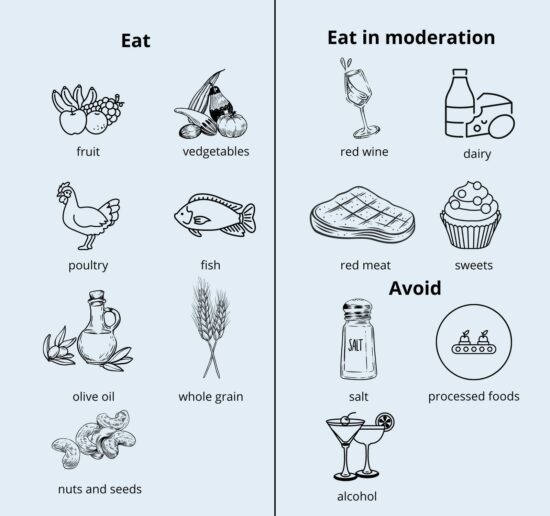The Mediterranean diet has been studied extensively for its health benefits, particularly for its positive effects on heart health. Several studies have suggested that this diet can lower your blood pressure and cholesterol levels, reduce the amount of inflammation that is present in the body, and reduce your overall risk of cardiovascular diseases.
With this article, we want to give you an insight into the relationship between this diet and your heart health, and we’ll provide you with some useful tips on how to sustain a healthy lifestyle with the Mediterranean diet.
The relationship between diet and cardiovascular health
The food that you eat has a significant direct impact on your heart health in many ways. On one hand, your body can only maintain its healthy state because of the intake of nutrients which you get from the food that you eat. On the other hand, having an unhealthy eating pattern may lead to cardiovascular diseases, inflammation, high blood pressure, and other conditions.
In order to obtain the ideal cardiovascular health, The American Heart Association developed a set of guidelines called ‘Life’s simple 7’. These guidelines can be summarized as:
- Don’t smoke
- Eat healthy foods
- Be active
- Lose weight if you’re overweight
- Manage your blood pressure
- Control your cholesterol
- Control your blood sugar
Besides quitting smoking and getting active, all other rules have a direct correlation to your diet. Following a balanced diet, with a high intake of nutrients and a low intake of products that put stress on your cardiovascular system, is an effective way to take care of your heart.
The Mediterranean diet is a great way to improve your cardiovascular health through your food intake. Various studies suggest that this diet has positive effects on your cardiovascular health, cognitive function, blood sugar, and blood pressure. It is even suggested that this diet decreases the risk of obesity and certain types of cancer.
What does the Mediterranean diet entail?
The Mediterranean diet emphasizes the intake of whole, minimally processed foods, such as fruits, vegetables, whole grains, nuts and seeds, as well as healthy fats which you can find in olive oil and fish. The Mediterranean diet is also rich in antioxidants and anti-inflammatory compounds, which can both help reduce inflammation in the body and protect you against the development of cardiovascular diseases.
Having a lot of food sources to choose from means that there are a lot of options to make delicious dishes which are also good for your health. This ultimately helps integrate this heart-healthy diet into your lifestyle without feeling like you’re having to give up on too many foods.
The Mediterranean diet is a sustainable and enjoyable way of eating mindfully, which you can implement long-term in your life, as it’s very adjustable to your personal preferences. It also comes with a set of improvements for your lifestyle, such as being active, reducing stress and getting support from those around you, which will all help reduce the risk of cardiovascular disease.

Some concrete tips and tricks for the Mediterranean diet
Start with small changes
Making changes to your lifestyle may be challenging, so it’s best to start off with small changes and a slow shift in habits, which will help you stick to your diet. The Mediterranean diet offers a lot of possibilities with lots of flavors, so it’s one of the best diets to integrate into your life long-term.
An abundance of fruits and vegetables
Fresh produce is a key element in the Mediterranean diet. This way, you’ll have a high intake of vitamins, minerals and antioxidants that are beneficial for your health. These benefits include improved digestion, better immune function, and a reduced risk for cardiovascular diseases, diabetes, and other illnesses.
Switch up the spices you’re using
One of the important parts of the Mediterranean diet is to decrease your salt intake. Salt is an essential mineral which our bodies need in small amounts to help regulate fluid balance and blood pressure. However, taking in too much salt can lead to negative effects such as high blood pressure, swelling of the limbs, kidney damage and stomach problems. You can bring a lot of flavor into your dishes by using other spices and herbs, such as basil, rosemary, thyme, parsley and garlic.
Go for fish instead of meat
Fish and seafood can provide high-quality protein, as well as healthy fats called omega-3 fatty acids. These omega-3 fatty acids can help lower your triglycerides levels, which are a type of fats that can contribute to the development of cardiovascular disease. Other than that, omega-3 fatty acids can also help reduce inflammation, lower blood pressure, and reduce the risk of arrhythmias. It is however important to find a balance between the things you eat, such as poultry, fish, and meat.
Moderation is key
One of the most important parts about the Mediterranean diet is that many foods should be eaten in moderation. Olive oil for example is a great source of heart-healthy fats, but you shouldn’t use too much of it either. The same goes for red wine. It contains several bioactive polyphenols which have anti-inflammatory properties according to some studies, but consuming too much of it is also not healthy for your heart.
What should you definitely avoid?
The food sources which you should definitely avoid are junk food and processed foods containing high amounts of sugar, saturated fats or salt. If you have the option, you should always go for fresh products.
Your way to a healthy heart
Whichever diet you choose to follow, it’s important to know that a healthy and balanced long-term diet is at the base of optimal heart health. The Mediterranean diet is one of the leading examples of how food can contribute to a healthy heart. Combining a healthy lifestyle with an active follow-up of your heart health with FibriCheck is the best way to avoid the complications of heart rhythm disorders.
Created on July 12th, 2023 at 01:56 pm
Last updated on October 23rd, 2023 at 10:43 am





